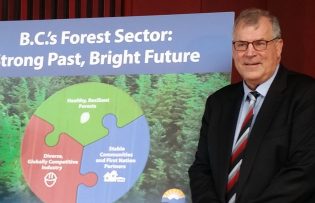AAC and SLA Remain Challenges for Forestry
P
(at right, Minister Steve Thomson)
The Chief Forester has yet to announce what the annual allowable cut will be, and there is still a Softwood Lumber Agreement to be hammered out.
“We are continuing all out efforts to reach an agreement” says Minister of Forests Steve Thomson of the efforts to reach a new SLA with the United States. The current “stand still” period will end in October, and Thomson expects the U.S. to take action “After that mid-October timeline, that’s when the U.S. can start anti-dumping and counter veiling action against the industry. If we don’t achieve an agreement or a framework before then, they will take that step, and we will defend the industry against those actions. We have said very clearly that a new agreement needs to be one that works for British Columbia, works for Canada it’s not an agreement at any cost as far as we’re concerned, So we will defend our policies and practices when and if that action starts. Our focus now is to prepare for that but we also have a very strong focus on achieving a new framework agreement if we can.”
As for the annual allowable cut, everyone expects a reduction to reflect the post Mountain Pine Beetle reality “The reality is we are facing a lower annual allowable cut in many parts of the province as a result of the mountain pine beetle epidemic” says Thomson. The AAC had been increased in an effort to get maximum benefit from Mountain Pine Beetle impacted forests while that wood was still merchantable. “So in those areas mean less fibre available” says Thomson who says the new forestry agenda released yesterday is focused on getting maximum value out of the available fibre “So what we do have, we’re getting maximum value”. He says the new reality in a post Mountain Pine Beetle industry also means government will have to work with those communities “As we look at diversifying economic opportunities and that’s government’s commitment to be engaging with communities as we go forward.”
He says communities are already accessing some of the funds being made available by the Province to help them transition or develop new economic opportunities. But even though those funding programs are in place, Thomson says that’s not to soften the blow of a major reduction in the annual allowable cut “This is a bright future for the industry, there are challenges, we recognize that, there will need to be adjustments in the community but what we are putting in place, is the initiative and agenda to work with industry through those ( challenges), just as we did through 2007 and 2009 with the downturn in the housing market the real collapse of the industry, we worked with the industry so we would still have a strong industry, building new markets building strong products.”
The Chief Forester is expected to announced the new annual allowable cut this fall, although there has been no specific date identified. “What we do know is that we need to do that work as soon as we can” says Thomson “It has to be done properly with full assessment because of the risk of not doing it is that you continue to harvest at potentially unsustainable levels.”

Comments
The Softwood Lumber Agreement (SLA) was negotiated at the time of NAFTA, but excluded from NAFTA. A genius move by Brian, for sure! Since then it has been a convenient tool for bullying us, even forcing us to pay the majority of their legal bills! It will more than likely have a similar outcome this time!
In order to determine and establish a sustainable Annual Allowable Cut, BC’s forest inventory must be known and managed… neither has been happening for over a decade!
Furthermore, the management of our forests in relation to other industry use has at time been a comedy of errors; like the time Canfor replanted a clear-cut. When Forest Practices Board auditors visited the cutblock near Chetwynd to check on seedlings replanted by logging company Canfor, instead of a healthy young forest, they found a gravel pit.
A mining company was operating the gravel pit. And the seedlings, of course, were gone.
The gravel operation was situated within a tree farm licence, but Canfor had not been told of the change in land use, which according to a bulletin the independent forests watchdog issued this week, is only one example of a long list of competing activities within that single tree farm licence.
The board auditors found everything from wind farms, mines, and natural gas wells, to pipelines, power lines and mineral exploration. Roads de-activated by the forest company had been re-activated in an improvised manner to explore for coal. Drill sites had been built on existing cutblocks, permanently removing the forest cover.
.vancouversun.com/news/metro/resource+development+remains+unknown+unmanaged+warns+forest/7993065/story.html
It’s the wild, wild, west for resource extraction in BC folks, and nobody is managing it!
Again, there seems to be an issue with the link I provided above. I have transferred it to another format and hopefully it will link you to the proper Vancouver Sun news article.
ht tp://tinyurl.com/zh5zyhv
Comments for this article are closed.